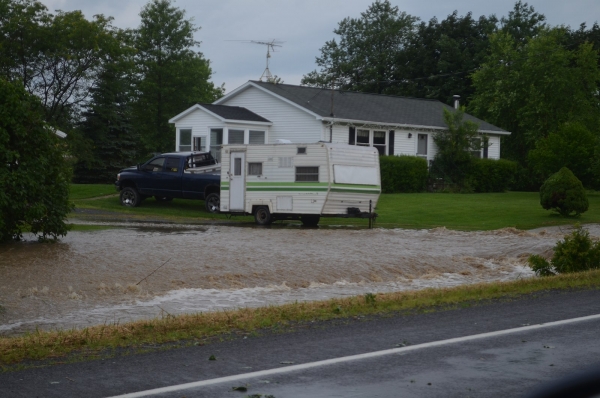The cause of flash flooding is simple: Rain is so heavy over such a short time that there’s no place for the water to go. It builds up along stream banks, where tributaries and rivers meet, and over streets and sometimes over other large paved surfaces, such as parking lots, especially when storm sewers back up.
Be prepared to act. Even street flooding can be hazardous. Don’t take this lightly. According to the weather service, almost two of three flash flood fatalities are vehicle-related, and flash floods kill more than other slower-forming, broader floods.
Flash Flood Warnings
This isn’t complicated. To access flood forecasting you need any of three things:
- Internet access plus a computer or smartphone/tablet.
- A TV that receives local programming with extreme weather alerts.
- A radio that receives local stations; especially helpful is the emergency broadcast station.
The weather service may issue a flash flood watch or a flash flood warning, or both. Know the difference:
Flash Flood Watch: Look out for possible flash flooding. It may happen or it may not, but be prepared to take action.
Flash Flood Warning: Flash flooding is imminent or is occurring. You must act immediately.
Here’s the danger about flash flooding: It can happen so fast that there’s really not time to issue the warning after the watch. That’s why it’s so important to be prepared to act when a watch is issued. The weather service repeatedly uses the expression “be prepared to take action” in its explanation of flash flood warnings.
Free Weather Forecasts
Although there are premium weather forecast services, you should get the information you need from no-fee weather services:
- National Weather Service. This taxpayer-funded weather forecasting system exists to protect lives and property. It takes flood forecasting very seriously. The NWS revamped its warning system in 2019, sometimes providing details on advancing or occurring weather through third-party apps. For all flash flood-specific news, go to weather.gov/ffc/warnings.
- Accuweather. The basic Accuweather service is free, available online or through a free smartphone app. When rain is forecast, it even lists an expected start time once you punch in your location. By and large it’s good information, although a bit fussy to navigate.
- Weather Channel/weather.com. Who hasn’t watched this channel on TV? The Weather Channel also has localized forecasts available through its free app for iPhone and Android devices.
- Weather Bug. With thousands of cameras installed around the country, Weather Bug lets you see what the weather is like in many places you may be heading. It senses where you are when you log on. You can access localized forecasts, radar and weather maps. It has free app downloads.
Flood Planning
The quickest way to avoid flooding is to reach higher ground. To be prepared, identify higher ground where you could move if flooding is imminent.
In a campground, when there’s no time to break camp and travel, the nearest higher ground is probably the spot where the office, community center and store are located.
Get in the habit of consulting not only daily weather reports, but also Google Maps when you enter an area. You can punch in your location and find a map that shows elevation levels and roads to reach high ground. And to repeat some advice given at other times in this blog, paper maps are a good backup in case a storm interrupts Internet and cell phone access.
Keep important documents—birth certificates and insurance policies if you’re a full-timer, and passports/identity papers if you’re a part-timer—in a watertight plastic bag and keep it handy. If the need arises, grab it and go.
The weather service recommends placing water and food in a watertight container and carry in backpacks or duffle bags. Keep a disaster kit with sealed food, water and a flashlight in your vehicle.
Weather Service recommendations include:
- Carry a cellphone and in case cell service fails, a portable radio to receive flood news.
- Take boots, rain apparel and blankets.
- Make sure you have road flares or triangles.
- You may be safer walking than remaining in a vehicle where water is rising.
- Never cross a flooded stream. The current can carry a vehicle or human away. And although it may not be as quick to carry your to vehicle, your tow vehicle will become uncontrollable if flood waters float your trailer.
- Take another route if a road is flooded. The road surface beneath the water may be washed away.
- Call 911 if you are stranded by water or forced from your vehicle; make sure children know how to place the call, including entering cell phone passwords.
